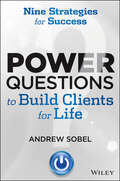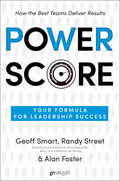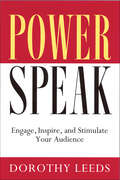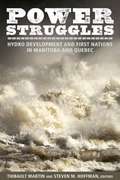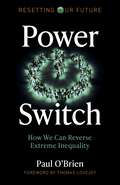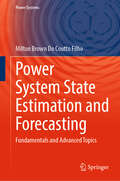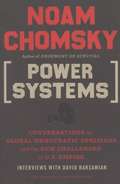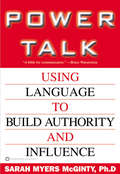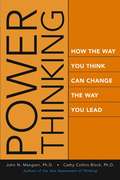- Table View
- List View
Power Play: Tesla, Elon Musk, and the Bet of the Century
by Tim Higgins&“A deeply reported and business-savvy chronicle of Tesla's wild ride.&” —Walter Isaacson, New York Times Book Review &“[A] sweeping history of the electric-car juggernaut…I&’ve covered Tesla as a reporter since 2016. When Higgins writes about facts and situations I&’m familiar with, I can attest he&’s right on the button, every time.&” —Russ Mitchell, Los Angeles TimesPower Play is the riveting inside story of Elon Musk and Tesla's bid to build the world's greatest car—from award-winning Wall Street Journal tech and auto reporter Tim HigginsElon Musk is among the most controversial titans of Silicon Valley. To some he's a genius and a visionary; to others he's a mercurial huckster. Billions of dollars have been gained and lost on his tweets; his personal exploits are the stuff of tabloids. But for all his outrageous talk of mind-uploading and space travel, his most audacious vision is the one closest to the ground: the electric car.When Tesla was founded in the 2000s, electric cars were novelties, trotted out and thrown on the scrap heap by carmakers for more than a century. But where most onlookers saw only failure, a small band of Silicon Valley engineers and entrepreneurs saw opportunity. The gas-guzzling car was in need of disruption. They pitted themselves against the biggest, fiercest business rivals in the world, setting out to make a car that was quicker, sexier, smoother, cleaner than the competition.But as the saying goes, to make a small fortune in cars, start with a big fortune. Tesla would undergo a hellish fifteen years, beset by rivals, pressured by investors, hobbled by whistleblowers, buoyed by its loyal supporters. Musk himself would often prove Tesla's worst enemy—his antics more than once took the company he had initially funded largely with his own money to the brink of collapse. Was he an underdog, an antihero, a conman, or some combination of the three?Wall Street Journal tech and auto reporter Tim Higgins had a front-row seat for the drama: the pileups, wrestling for control, meltdowns, and the unlikeliest outcome of all, success. A story of power, recklessness, struggle, and triumph, Power Play is an exhilarating look at how a team of eccentrics and innovators beat the odds—and changed the future.
Power Plays: Shakespeare's Lessons in Leadership and Management
by John O. Whitney Tina PackerThe issues fueling the intricate plots of Shakespeare's four-hundred-year-old plays are the same common, yet complex issues that business leaders contend with today. And, as John Whitney and Tina Packer so convincingly demonstrate, no one but the Bard himself can penetrate the secrets of leadership with such piercing brilliance. Let him instruct you on the issues that managers face every day:Power: Richard II's fall from power can enlighten us. Trust: Draw on the experiences of King Lear and Othello. Decision: Hamlet illustrates the dos and don'ts of decision making. Action: See why Henry IV was effective and Henry VI was not. Whitney and Packer do not simply compare Shakespeare's plays with management techniques, instead they draw on their own wealth of business experience to show us how these essential Shakespearean lessons can be applied to modern-day challenges. Power Plays infuses the world of business with new life -- and plenty of drama.
Power Purchase Agreements in the Transition to Green Energy and Climate Neutrality (Sustainable Management, Wertschöpfung und Effizienz)
by Elena Andreea NiculescuThis book addresses one of the most important legal instruments that can help combat climate change, namely Power Purchase Agreements. As decarbonisation is essential for the global transition to electricity, these contracts are a direct legal link that can be formed between the power producer and the power buyer. This type of contract plays an important role in stimulating the creation and development of more renewable energy projects, such as wind, solar or hydro, by providing secure and long-term revenues for producers, while customers benefit from long-term price predictability. The implementation and development of the signing of these contracts are evaluated in this research, with taking into consideration both the economic, legal and social impacts, as well as the effects on the environment. The analysis addresses the risks to which the parties are subject once these contracts are signed, the key factors that influence the development of these contractual relationships, with consideration of concrete cases where PPA market is a developed one, as well as examining these contracts with other legal financial instruments that have the same purpose and aim, namely Contracts for Difference.
Power Purchase Agreements: Stromlieferverträge für Erneuerbare Energien (essentials)
by Stephan SchnorrIn diesem essential werden Power Purchase Agreements nach verschiedenen Kriterien, wie Lieferrichtung, Preisregime oder Anlagenart kategorisiert. Außerdem wird auf die Besonderheit des fluktuierenden Einspeiseverhaltens von Erneuerbaren Energien eingegangen. Insbesondere dieses Verhalten hat Auswirkungen auf die Bepreisung derartiger Verträge. Bei der Beschreibung der Bepreisung wird insbesondere die Capture Rate näher vorgestellt. Ein weiterer wesentlicher Punkt ist die Bewirtschaftung von PPAs, also den Prozessen während der Belieferung. Den Abschluss bildet ein Exkurs zu Herkunftsnachweisen, die in Power Purchase Agreements in der Regel mit übertragen werden.
Power Quality Enhancement of Wind Energy Systems
by Adel A. Elbaset Wessam Arafa HafezThe continuous increase of wind power penetration levels in Egypt makes wind a critical component of power generation in the grid. Studying wind power quality issues and the interaction between wind turbines and the grid is necessary and imperative. The authors present research on power quality and grid code issues, harmonics and wind power, voltage stability improvement using STATCOM, control techniques for active power filters, and the economics of electrical wind energy. The simulation for all of the studies presented is carried out in a MATLAB/Simulink environment using the Simulink power system toolbox. The book also presents case studies on an electrical network-connected wind energy conversion system and gives an overview of the feasibility of having wind power plants in several regions in Egypt, along the Gulf of Suez, on both sides of the Nile, the Mediterranean Sea, and South Upper Egypt.
Power Questions
by Andrew Sobel Jerold PanasAn arsenal of powerful questions that will transform every conversation Skillfully redefine problems. Make an immediate connection with anyone. Rapidly determine if a client is ready to buy. Access the deepest dreams of others. Power Questions sets out a series of strategic questions that will help you win new business and dramatically deepen your professional and personal relationships. The book showcases thirty-five riveting, real conversations with CEOs, billionaires, clients, colleagues, and friends. Each story illustrates the extraordinary power and impact of a thought-provoking, incisive power question. To help readers navigate a variety of professional challenges, over 200 additional, thought-provoking questions are also summarized at the end of the book. In Power Questions you'll discover: The question that stopped an angry executive in his tracks The sales question CEOs expect you to ask versus the questions they want you to ask The question that will radically refocus any meeting The penetrating question that can transform a friend or colleague's life A simple question that helped restore a marriage When you use power questions, you magnify your professional and personal influence, create intimate connections with others, and drive to the true heart of the issue every time.
Power Questions to Build Clients for Life
by Andrew SobelUse the power of questions to deepen and grow your client relationshipsThe right question can shift a conversation from the analytical to the emotional, from the details to the big picture, and from the past to the future. The result? Deeper client knowledge, more intimate relationships, and a clear understanding of how you can add more value. Power Questions to Build Clients for Life shows how to use strategic questions to implement nine essential clients-for-life strategies. You'll learn:How to select the right clients to begin withGrowth strategies to broaden your relationshipsTechniques for building personal relationships with your clientsPowerful questions to help you connect in the C-SuiteTen questions you must ask your clients every year in order to assess your relationship healthPower Questions to Build Clients for Life gives you both the strategies and the key questions to develop trusted partnerships with your most important clients.
Power Questions to Win the Sale
by Andrew SobelUse the power of questions to accelerate your sales process and gain client commitment.Skillfully build rapport. Establish your credibility. Uncover a client's issues. Determine if your prospect is really ready to buy. Get commitment to a next step. Power Questions to Win the Sale provides specific strategies and techniques to help you successfully manage the most common challenges in sales. For each step in the sales process, it gives you a series of thoughtful questions that will help you rapidly turn a contact into a client. Drawing on the author's bestselling Power Questions, this short e-book shows you how to:Sequence your agenda and use questions at the right moments in the sales processEstablish yourself as an expert through credibility-building questions rather than slide presentationsDraw out the client's agenda of essential priorities and goalsPosition your proposal to win by meeting eight key preconditions before you submit itUnblock a sale that is stalledPower Questions to Win the Sale is a practical roadmap for balancing advocacy and inquiry during the sales process and winning new business more consistently and confidently.
Power Relationships
by Andrew Sobel Jerold PanasThe Relationship Laws that Drive SuccessThere are powerful but invisible laws that determine whether your relationships --with your clients, colleagues, and friends--will thrive or wither. These relationship laws are ever-present. When you align with them, the results are dramatic. Your network will grow rapidly. You'll be seen by clients as a trusted partner rather than an expense to be managed. And you'll find the people around you eager to help you succeed.When you ignore the laws, however, your efforts will falter. Relationship building will seem like very hard work.Power Relationships gives readers a unique, entertaining guide to relationship success at work and in life. Each of the 26 laws is illustrated and explained using a compelling, real-life story that shows how to implement it. The second section of the book presents 16 common relationship challenges with specific solutions. You'll read about:The top Citigroup executive whose relationship with a CEO was changed forever on a business trip that exploded into chaos, and how you can use the same principle to deepen your own relationships.The philanthropist who, on the verge of being mugged in a dark parking lot, learns how his actions have had an unimaginable ripple effect across several generationsHow one of the authors flew halfway around the world and used Law 18--"Make them curious"--to turn a make-or-break, five-minute meeting with a top executive into a long-term relationship. The chance encounter on an airplane with a famous actor that revealed a simple but profound truth. It's Law 25: "Build your network before you need it."Sobel (author of Clients for Life, All for One, and Power Questions (with Panas)) and Panas (author of Asking and Supremely Successful Selling) have sold over half a million books and are the leading authorities in their field. Power Relationships is a unique, road-tested guide to relationship success.
Power Score
by Geoff Smart Randy Street Alan FosterghSMART, the bestselling team behind Who: The A Method for Hiring, returns with a breakthrough formula for how the best leaders and teams deliver results. "ghSMART is the world's top firm for helping leaders hire talented teams and run them at full power. Nothing is more important."--Marshall Goldsmith, bestselling author of Mojo and What Got You Here Won't Get You There "The most useful book about leadership." That is what we hope you and your team will say after finishing Power Score. Is your team running at full power? Only 10 percent of leaders run their teams at full power. The formula you are about to learn is based on the most extensive research of its kind, spanning more than 15,000 careers with over 9 million data points. The idea has been battle-tested for more than two decades by leaders in every major industry. It works. Successful leadership starts with three key questions: 1. Priorities--Do we have the right priorities? (Only 24 percent of leaders do.) 2. Who--Do we have the right people on the team? (Only 14 percent of leaders do.) 3. Relationships--Do we have the right relationships that deliver results? (Only 47 percent of leaders do.) Learn how to calculate your team's Power Score, and how to improve each of the three key areas of leadership. Learn what to do, and what not do, from compelling statistics and inspiring stories of those leaders who have succeeded and those who have failed. You may be surprised how easy it is to read this little book. And you may be even more surprised by how fast this approach will boost your team's results. When you dial up your team's Power Score, you will make a greater impact as a leader, help your team earn more money for your cause (whatever your cause may be), and enjoy greater career success.Advance praise for Power Score "The power score is the secret sauce that gives the group the information needed to fix problems. The authors provide plenty of guidance presented in an accessible Q&A format."--Success"I wouldn't be surprised if Power Score became the new go-to guide for leadership. Effective teams are key in everything from healthcare to business to government to nonprofits, and this book will help organizations change the conversation about getting results."--Atul Gawande, New York Times bestselling author of Being Mortal and The Checklist Manifesto "Smart, Street, and Foster have turned more than twenty years of research on leadership into a practical, systematic approach for getting results."--Frederick W. Smith, chairman and chief executive officer of FedEx Corporation "My entire team applied the principles of Power Score and has enjoyed explosive growth as a result. Even better, I am having more fun as a leader than ever before."--Jeff Booth, chief executive officer and founder of BuildDirect "The ghSMART team has done it again. With Who, they demystified the process of hiring A Players. Now they have decoded how to become an A+ leader."--Panos Anastassiadis, managing partner of Global CyberFrom the Hardcover edition.
Power Sources: How You Can Tap Them
by Richard LueckePower is a necessary element of organizational work. This chapter deconstructs its three sources, helping you understand how to build it through coalitions and interpersonal dependencies and how to detect and monitor where power resides within an organization.
Power Speak: Engage, Inspire, and Stimulate Your Audience
by Dorothy LeedsWhat is the secret to being a captivating and credible speaker? Never be boring! If you are boring, people will not listen. The central message and focus of PowerSpeak is the importance of engaging, stimulating, and maintaining an audience's attention.This book focuses on the elements of speaking effectively from a design and a delivery perspective. Dorothy Leeds isolates these essential elements to assure that any speaker can gain and keep the audience's attention. She focuses on the trouble spots of any presentation and the six major faults speakers make.This book also includes tips on the following:•Breaking the fear barrier.•Ten steps that guarantee a complete presentation.•How to avoid weak, passive language and make humor your ally.•Voice and speech exercises.•How to handle the Q & A portion of a presentation.•How to develop your own style and project positive body language.•How to incorporate (or not incorporate) new technology into presentations.
Power Struggles: Energy Security and Energy Diplomacy in the Asia Pacific
by Se Hyun AhnThis book explores East Asia’s and the Asia Pacific’s energy security exploring key issues including major trans-border energy projects, major country’s energy mix policy, trans- border pipelines, LNG transfer between nations, balance of power relations between major powers, the North Korean energy situation, energy alliances, Belt and Road Initiative, Indo-Pacific Strategy, World Choke point and more. In particular, this book provides the detailed analysis of the current problems of energy security and diplomacy among various countries as well as policy implications. It will clearly serve as a manual to enhance energy security in the region and boost energy transaction as well as the pioneering step to conceptualize the notion of energy security among political circles, in the diplomatic community and energy industry as well as international relations academics.
Power Struggles: Hydro Development and First Nations in Manitoba and Quebec
by Thibault Martin Steven M. HoffmanPower Struggles: Hydro Development and First Nations in Manitoba and Quebec examines the evolution of new agreements between First Nations and Inuit and the hydro corporations in Quebec and Manitoba, including the Wuskwatim Dam Project, Paix des Braves, and the Great Whale Project. In the 1970s, both provinces signed so-called “modern treaties” with First Nations for the development of large hydro projects in Aboriginal territories. In recent times, however, the two provinces have diverged in their implementation, and public opinion of these agreements has ranged from celebratory to outrage.Power Struggles brings together perspectives on these issues from both scholars and activists. In debating the relative merits and limits of these agreements, they raise a crucial question: Is Canada on the eve of a new relationship with First Nations, or do the same colonial attitudes that have long characterized Canadian-Aboriginal relations still prevail?
Power Switch: Energy Regulatory Governance in the Twenty-First Century
by Monica Gattinger G. Bruce DoernIn the energy sector of Canadian economic and political life, power has a double meaning. It is quintessentially about the generation of power and physical energy. However, it is also about political power, the energy of the economy, and thus the overall governance of Canada. Power Switch offers a critical examination of the changing nature of energy regulatory governance, with a particular focus on Canada in the larger contexts of the George W. Bush administration's aggressive energy policies and within North American energy markets.Focusing on the key institutions and complex regimes of regulation, Bruce Doern and Monica Gattinger look at specific regulatory bodies such as the National Energy Board, the Alberta Energy and Utilities Board, and the Ontario Energy Board. They also examine the complex systems of rule making that develop as traditional energy regulation interacts and often collides with environmental and climate change regulation, such as the Kyoto Protocol on reducing greenhouse gas emissions. Power Switch is one of the first accounts in many years of Canada's overall energy regulatory system.
Power Switch: How We Can Reverse Extreme Inequality (Resetting Our Future)
by Paul O'Brien"The bad news is that the world is in crisis; the good news is that transformative activism can overcome it. Will the more formal progressive institutions have the courage to go all in with that activism?" Ben Phillips, author of How to Fight InequalityIs it actually possible? …that we might emerge from this pandemic with a peaceful global power switch from those who have too much to those who don't have enough? With billionaires able to decide the fate of nations, private corporations more powerful and less accountable than ever, and political autocrats around the world shaking our confidence in democratic institutions, power resides in all the wrong places. And so our world is in crisis. In such moments, activists find opportunities. Not to restore the pre-crises order, but to transform it. Paul O'Brien argues that progressive activists may never have a better opportunity to rewrite economic rules, systems and outcomes in favor of those who don't have enough. His book offers practical action steps for activists who want to drive a power switch that overcomes extreme inequalities in our world.
Power System Assets: Investment, Management, Methods and Practices (CIGRE Green Books)
by Graeme Ancell Gary L. Ford Earl S. Hill Jody Levine Christopher Reali Eric Rijks Gérald SanchisThis CIGRE Green Book describes the state-of-the-art of power Systems asset management dealing with all aspects asset management practice. The major focus of the book is on documenting practical methods that bridge the gap between just satisfying an asset management process and achieving real asset management results in the form of smarter investment decisions. The book facilitates collaboration and blending of the engineering and technical aspects of asset management and the financial considerations needed to support asset investment decisions using risk-based business case analysis. Detailed case studies are included to illustrate generic and specific or customized methods and to demonstrate the application of such methods from the technology perspectives of several CIGRE study committees. This practical guide is suitable for working asset managers and decision-makers (both engineering and financial) dealing with all aspects of the practice of asset management.
Power System Flexibility: Modeling, Optimization and Mechanism Design (Power Systems)
by Ming Zhou Gengyin Li Zhaoyuan WuThis book provides a detailed description of the flexibility of the power system with high share of variable renewable generation, including power system flexibility modeling, flexibility-based economic dispatch, demand side flexibility response, large-scale distributed flexible resources aggregation and market design for enhancing the flexibility of the power system, etc. The book provides an appropriate blend of theoretical background and practical applications of the power system flexibility, which are developed as working algorithms, coded in MATLAB and GAMS environments. This feature strengthens the usefulness of the book for graduate students and practitioners. Students will gain an insightful understanding of the flexibility of the power system with high share of renewables integration, including: (1) the formulation of flexibility modeling and flexibility-based economic dispatch models, (2) the familiarization with efficient solution algorithms for such models, (3) insights into these problems through the detailed analysis of numerous illustrative examples and (4) market design approach for enhancing the flexibility of the power system. Hopefully, this book greatly benefits readers in the fields of energy economics and engineering.
Power System State Estimation and Forecasting: Fundamentals and Advanced Topics (Power Systems)
by Milton Brown Do Coutto FilhoThis classroom-tested text offers students an overview of classical and recent state estimation techniques in power systems. It includes well-established, widely accepted information presented in a didactic way and new insights and perspectives on state estimation developed by the author while conducting some of the most cutting-edge research in the field. This well-balanced mix of theory and practice will enable readers to understand state estimation techniques quickly. The book includes a user-friendly open-software tool integrating computer-based examples throughout the text. Case studies based on practical applications provide readers with a solid understanding of state estimation in real-world power systems. Power System State Estimation and Forecasting: Fundamentals and Advanced Topics is designed for upper-level undergraduate and graduate-level courses in electric power systems. It is also an essential professional reference on electric power systems for practicing engineers and researchers.
Power Systems Cybersecurity: Methods, Concepts, and Best Practices (Power Systems)
by Nikos Hatziargyriou Zhao Yang Dong Hassan Haes AlhelouThis book covers power systems cybersecurity. In order to enhance overall stability and security in wide-area cyber-physical power systems and defend against cyberattacks, new resilient operation, control, and protection methods are required. The cyberattack-resilient control methods improve overall cybersecurity and stability in normal and abnormal operating conditions. By contrast, cyberattack-resilient protection schemes are important to keep the secure operation of a system under the most severe contingencies and cyberattacks. The main subjects covered in the book are: 1) proposing new tolerant and cyberattack-resilient control and protection methods against cyberattacks for future power systems, 2) suggesting new methods for cyberattack detection and cybersecurity assessment, and 3) focusing on practical issues in modern power systems.
Power Systems Research and Operation: Selected Problems II (Studies in Systems, Decision and Control #220)
by Artur Zaporozhets Ihor Blinov Ievgen Zaitsev Olexander Kyrylenko Serhii Denysiuk Denys DereviankoThe book examines the problems in the fields of power systems functioning, optimization of operating modes of electric power facilities and their control systems, information and measuring systems and metrological support in the electric power industry, ensuring the functioning of the electric power system in the conditions of a competitive market of the electric power. The book is devoted to modern problems ensuring operational reliability and safety of objects integrated power system of Ukraine in the areas such as distribution systems automation, forecasting and optimization of energy processes with solar power plants, hydropower plants and other plants, and development solutions for smart monitoring systems for DERs. The presented research results in the book allow to increase the reliability and efficiency of operation of energy facilities and ensure the stability of power systems, the introduction of effective methods and tools for forecasting electricity supply and optimize power systems taking into constraints in modern of electricity markets. The book consists of 14 chapters. The book is for researchers, engineers, as well as lecturers and postgraduates of higher education institutions dealing with problems of operation, control, diagnosis and monitoring of integrated power system, power equipment, and other.
Power Systems: Conversations on Global Democratic Uprisings and the New Challenges to U. S. Empire
by Noam ChomskyA compelling new set of interviews on changing and turbulent times with Chomsky, one of the world's foremost thinkers. As always, Chomsky presents his ideas vividly and accessibly, with uncompromising principle and clarifying insight.
Power Talk: Using Language to Build Authority and Influence
by Sarah Myers McgintyAs anyone whos ever tried to decipher their last investment account statement knows, the language of finance can sound foreign and intimidating. As clever as it is straightforward, and filled with quirky yet helpful tips, this dictionary of financial terms and acronyms is packed with hundreds of brief, plain-spoken definitions that will appeal to the novice and seasoned investor alike.
Power Teams Beyond Borders: How to Work Remotely and Build Powerful Virtual Teams
by Peter IvanovEmpower your virtual and remote teams with this comprehensive and timely new resource Power Teams Beyond Borders: How to Work Remotely and Build Powerful Virtual Teams shows readers how to unlock the potential of their remote and online teams. Full of actionable advice and concrete strategies, celebrated consultant and author Peter Ivanov offers virtual leaders practical guidance on how to create and sustain online engagement across multiple time zones and cultures. The book includes step-by-step advice on areas like: How to build trust and clarity without meeting in person How to establish structure in communications and avoid confusion How to make the most of your team members’ unique talents in a global setting How to use the technique of “over-communication” to ensure your team members remain fully informed Perfect for anyone who’s expected to lead in an online or virtual environment, Power Teams Beyond Borders also belongs on the bookshelves of everyone who hopes to deliver results in an environment that includes remote teamwork.
Power Thinking
by Cathy Collins Block John MangieriMost individuals were never formally taught thinking skills and, as a result, are using processes that were developed during childhood to reach decisions and solve problems. Thus, in an era of knowledge explosion, organizational performance accountability, and rapid change caused by technology, leaders and managers are trying to succeed using thinking patterns developed before they were twelve years old. Power Thinking offers leaders the information they need to evaluate their current thinking proficiencies, determine areas for improvement, and enhance their thinking skills. The book includes the Yale Assessment of Thinking, a standardized assessment measure that enables readers to determine their abilities in the cognitive domains found to be crucial to being an outstanding leader.






